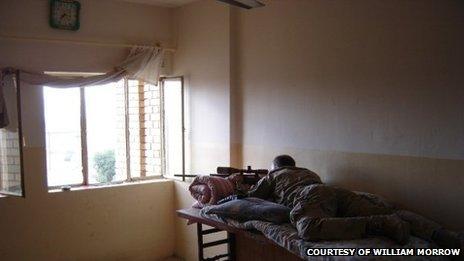American Sniper: Was Chris Kyle really a hero?
- Published
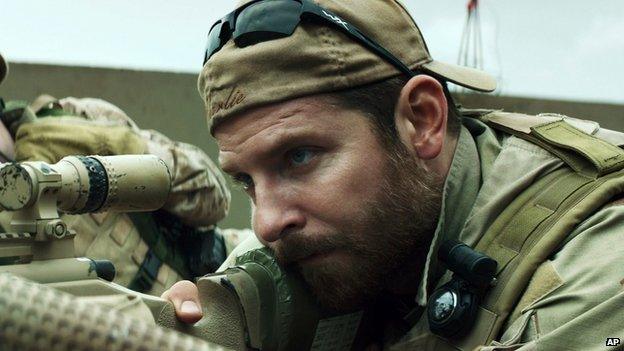
Bradley Cooper plays Chris Kyle in the film American Sniper
Was Chris Kyle a hero or a blowhard of questionable morality with a quick trigger finger?
This question is at the heart of a debate over Clint Eastwood's American Sniper, which has reached a fever pitch after the Oscar-nominated film set a record for a January box office weekend opening, with takings of $90m (£59m).
The controversy surrounding American Sniper has little to do with the film as an artistic effort, which has generally been praised by critics. It has everything to do with Kyle himself, the Navy Seal who served four tours of duty in Iraq, killed more than 160 people there and authored the autobiographical book upon which the film is (sometimes loosely) based.
Kyle was killed in February 2013 on a firing range in his home state of Texas by Eddie Routh, a Iraq War veteran who Kyle was trying to help recover from post-traumatic stress disorder.
As Salon's Andrew O'Hehir writes, external: "American Sniper, the movie, is a character study about a guy who sees himself as fundamentally honourable and decent, but whose simplistic moral code turns out to be exceptionally poor preparation for the real world and real warfare."
The true life story of Chris Kyle, however, is much more complicated.
Amy Nicholson of Slate takes particular aim, external at Kyle's book, which she says contains jingoistic braggadocio. She also asserts that he made false claims, external of heroic acts since returning to the US - such as killing two carjackers, external in Texas and punching former Minnesota Governor Jesse Ventura for disparaging US soldiers. (Mr Ventura sued Kyle's estate for defamation and was awarded, external $1.8m in damages.)
Eastwood, she writes, should have addressed this. Instead, he "pretended Kyle never claimed any of it. But when a film erases the fact that its subject was a fabricator, then that itself is a lie".
"American Sniper convinces viewers that Chris Kyle is what heroism looks like: a great guy who shoots a lot of people and doesn't think twice about it," she continues.
The Guardian's Lindy West goes even farther, saying, external the film "raises disturbing questions about which stories we choose to codify into truth, and whose, and why, and the messy social costs of transmogrifying real life into entertainment".
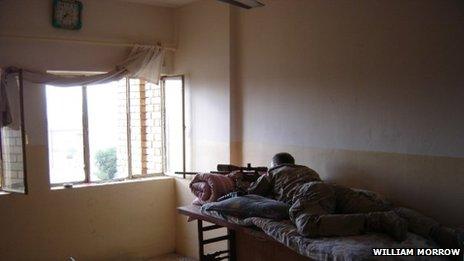
Chris Kyle, photographed here in Fallujah, served four tours in Iraq
"There is no room for the idea that Kyle might have been a good soldier but a bad guy; or a mediocre guy doing a difficult job badly; or a complex guy in a bad war who convinced himself he loved killing to cope with an impossible situation; or a straight-up serial killer exploiting an oppressive system that, yes, also employs lots of well-meaning, often impoverished, non-serial-killer people to do oppressive things over which they have no control," she writes.
On the conservative side, writers are hailing American Sniper as an authentic "cultural moment", in the words, external of the National Review's David French. He describes going to a packed theatre in Franklin, Tennessee, to celebrate a story about a war hero "on a truly national, cultural scale".
"Chris Kyle has entered the pantheon of American warriors - along with Alvin C York and Audie Murphy - giving a new generation of young boys a warrior-hero to look up to, to emulate," he writes.
More than that, however, he says the film also reveals the true nature of the US's adversaries.
"American Sniper goes where no movie has gone before in showing how the enemy uses children, kills children and savagely tortures its enemies," he writes.
The film also shows that while war can be traumatic, most soldiers "emerge on the other side, often better men".
"There is also fierce pride in service, new insights on life and our world, new appreciation for the blessings of liberty and the love of family, and many other perspectives and experiences that enrich the lives of veterans and veterans' families," he continues.
American Sniper makes "heads explode on the left" because it portrays Kyle as unapologetic for the Iraqis he kills, writes, external the Federalist's Rebecca Cusey. Instead, she says, he expresses regret for the American soldiers he fails to save and the civilians he fails to protect.
"A warrior has a job to do," she writes. "It is a noble job. It is a hard job. He takes those moments upon himself so the rest of us will not have to. He looks evil in the eye and stands up to it so we can sleep soundly."
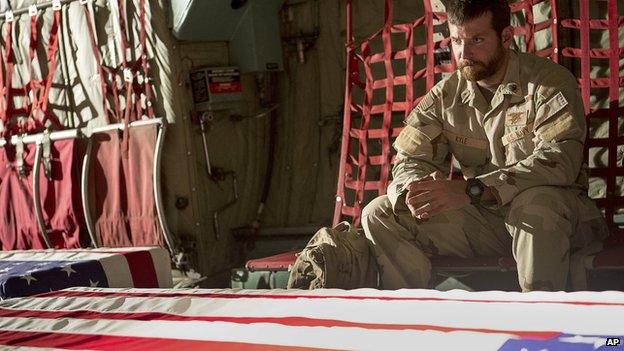
Reaction to American Sniper reveals that the divisions of the Iraq War still run deep
In a 2012 interview with the BBC, Kyle made that point directly.
"Every person I killed I strongly believe that they were bad," he said. "When I do go face God there is going to be lots of things I will have to account for, but killing any of those people is not one of them."
The liberal criticism of the film, and Kyle, has prompted a torrent of social media pushback - and, as detailed, external by Rania Khalek, who wrote an article critical of the film on Storify, that includes some particularly vile invective.
"Some fantasise about IS raping and beheading me," she writes. "Others hope I am killed by a sniper. Most can't spell or write coherently. Nearly all agree that Kyle was a hero and we should be thanking him for killing Iraqis to protect our freedom to tweet."
Drew McWeeny of Hitfix worries, external that the backlash represents "some fundamental break that has occurred in the way we talk to each other in this country".
It's common fallacy to paint your opponents with the lunatic rantings of a small but vocal segment of those on social media, but McWeeny may be right about the "fundamental break" that American Sniper reveals.

Chris Kyle speaks to BBC News Magazine
"This was the first time I was going to have to kill someone. I didn't know whether I was going to be able to do it, man, woman or whatever.
"You're running everything through your mind. This is a woman, first of all. Second of all, am I clear to do this, is this right, is it justified?
"And after I do this, am I going to be fried back home? Are the lawyers going to come after me saying, 'You killed a woman, you're going to prison'?"

Once again, we have evidence of two Americas - one that embraces Kyle as a hero and another that sees him as anything but. One that sees the world as a conflict between good and evil (wolves, sheep and their sheepdog protectors, as the film describes it, external) and one in which grey shades dominate and snipers - even US military ones - can be "cowards", in filmmaker Michael Moore's words, external.
The response to American Sniper clearly has moved beyond Kyle and became an opportunity to reprosecute the entirety of the Iraq War.
Many Americans are embracing American Sniper because they "are unable to accept that nothing was won in Iraq, and that the sacrifices Kyle and others made were not worth it," writes, external the New Republic's Dennis Jett.
"More fundamentally, treating Kyle as a patriot and ignoring any other possibility allows Americans to ignore the consequences of invading a country that had no weapons of mass destruction, had nothing to do with 9/11 and had no meaningful ties to al Qaeda (our invasion, of course, changed that)."
Meanwhile John Nolte, of the conservative website Breitbart,com, offers this, external: "The very same people lying about Chris Kyle today are the very same people who demanded we abandon Iraq to the terrorists, and with it, 25 million innocent Iraqi civilians."
And that, perhaps, gets at the heart of the controversy over American Sniper. It took more than a decade after the end of the Vietnam War for Hollywood, in the Oscar-winning film Platoon, to prompt a nationwide debate about the societal scars of that conflict.
The end of major US involvement in Iraq - if it can be said to have ended at all - is only three years past. The wounds here are still deep and fresh.
Chris Kyle was interviewed by Outlook for the BBC World Service. Listen to the interview here.
- Published19 January 2015
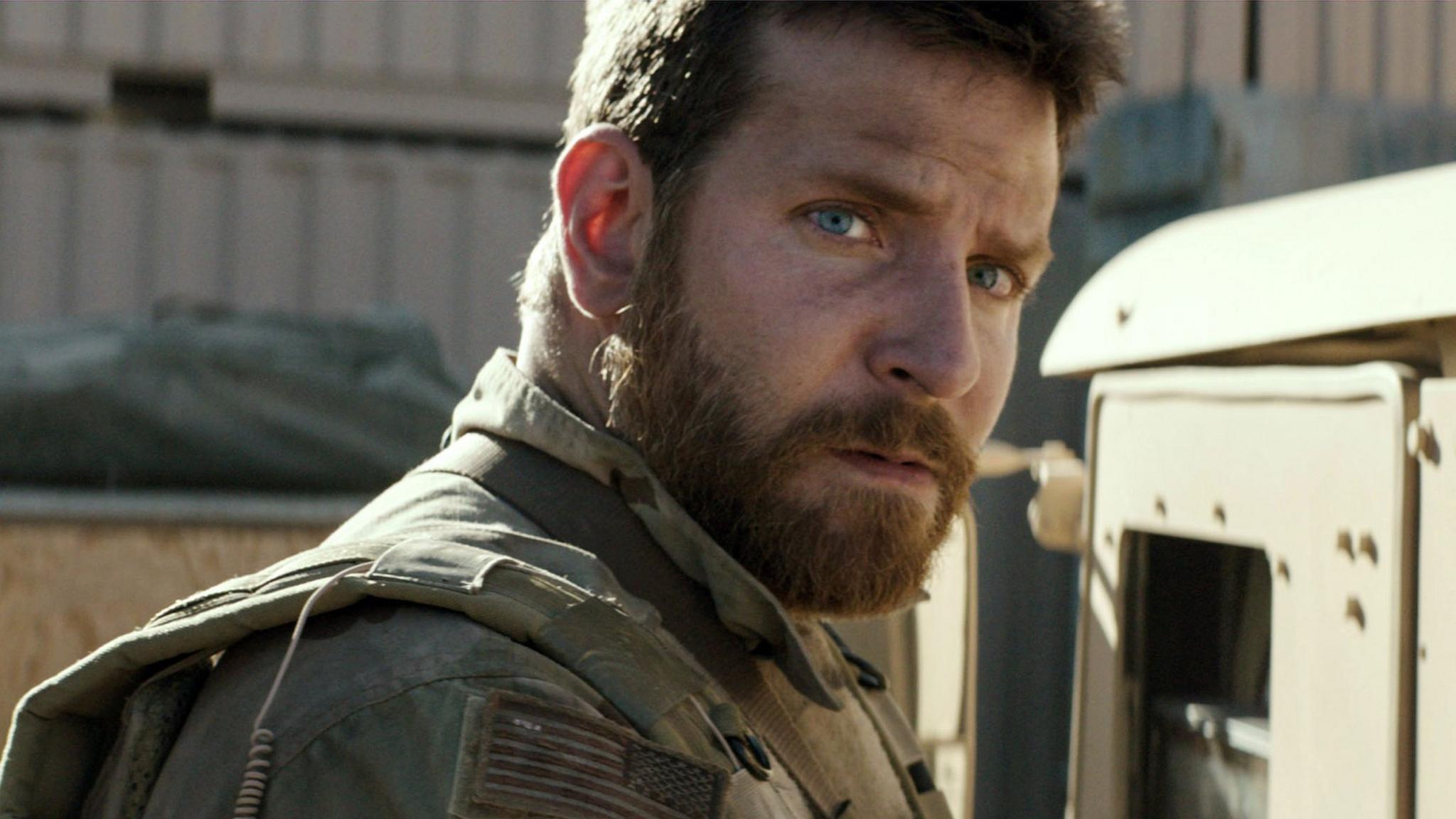
- Published22 January 2014
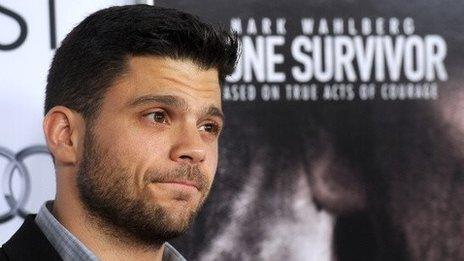
- Published25 January 2012
